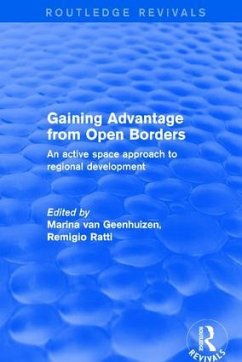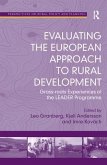Remigio RattiGaining Advantage from Open Borders (2001): An Active Space Approach to Regional Development
Revival
Gaining Advantage from Open Borders (2001): An Active Space Approach to Regional Development
Herausgeber: Geenhuizen, Marina Van
Remigio RattiGaining Advantage from Open Borders (2001): An Active Space Approach to Regional Development
Revival
Gaining Advantage from Open Borders (2001): An Active Space Approach to Regional Development
Herausgeber: Geenhuizen, Marina Van
- Broschiertes Buch
- Merkliste
- Auf die Merkliste
- Bewerten Bewerten
- Teilen
- Produkt teilen
- Produkterinnerung
- Produkterinnerung
This title was first published in 2001. The contributors to this book examine how changing political borders and disappearing obstacles in transport have led to diverging patterns of interaction between European regions, with different outcomes.trajectories are identified and analyzed.
Andere Kunden interessierten sich auch für
![Migration Borders Freedom Migration Borders Freedom]() Harald BauderMigration Borders Freedom166,99 €
Harald BauderMigration Borders Freedom166,99 €![Evaluating the European Approach to Rural Development Evaluating the European Approach to Rural Development]() Leo GranbergEvaluating the European Approach to Rural Development167,99 €
Leo GranbergEvaluating the European Approach to Rural Development167,99 €![Revival Revival]() Ettie A. RoutRevival265,99 €
Ettie A. RoutRevival265,99 €![Cultural Heritage of the Great War in Britain Cultural Heritage of the Great War in Britain]() Ross J. WilsonCultural Heritage of the Great War in Britain177,99 €
Ross J. WilsonCultural Heritage of the Great War in Britain177,99 €![Interrogating Alterity Interrogating Alterity]() Duncan FullerInterrogating Alterity177,99 €
Duncan FullerInterrogating Alterity177,99 €![Rural Settlement in an Urban World Rural Settlement in an Urban World]() Michael BunceRural Settlement in an Urban World35,99 €
Michael BunceRural Settlement in an Urban World35,99 €![Mobilities Mobilities]() John UrryMobilities187,99 €
John UrryMobilities187,99 €-
-
-
This title was first published in 2001. The contributors to this book examine how changing political borders and disappearing obstacles in transport have led to diverging patterns of interaction between European regions, with different outcomes.trajectories are identified and analyzed.
Produktdetails
- Produktdetails
- Verlag: Routledge
- Seitenzahl: 416
- Erscheinungstermin: 25. Januar 2019
- Englisch
- Abmessung: 234mm x 156mm x 22mm
- Gewicht: 629g
- ISBN-13: 9781138728493
- ISBN-10: 1138728497
- Artikelnr.: 56927761
- Herstellerkennzeichnung
- Libri GmbH
- Europaallee 1
- 36244 Bad Hersfeld
- gpsr@libri.de
- Verlag: Routledge
- Seitenzahl: 416
- Erscheinungstermin: 25. Januar 2019
- Englisch
- Abmessung: 234mm x 156mm x 22mm
- Gewicht: 629g
- ISBN-13: 9781138728493
- ISBN-10: 1138728497
- Artikelnr.: 56927761
- Herstellerkennzeichnung
- Libri GmbH
- Europaallee 1
- 36244 Bad Hersfeld
- gpsr@libri.de
Remigio Ratti, Marina van Geenhuizen
Contents: Introduction: An active space approach to regional development,
Marina van Geenhuizen and Remigio Ratti;
Regional active space: a regional scientist's paradigmatic answer to the
local-global debate, Remigio Ratti;
The importance of being active. A comment on the active space approach from
an Austrian perspective, Michael Steiner;
Governance for territorial development: what is it about?, Alberto
Bramanti. Reasons For an Active Space Approach: Obstacles to openness of
border regions in Europe, Piet Rietveld; Openness: a value in itself? the
case of the Dutch-German Ems-Dollart region, Enne de Boer;
The determinants of cross-border economic relations. The case of The
Netherlands and Belgium, Henk van Houtum; Cross-border economic dynamics.
Threats or opportunities in the Swiss-Italian labour market, Mario A.
Maggioni and Alberto Bramanti;
Which role for foreign direct investment? Active space development in
Central and Eastern Europe, Marina van Geenhuizen; In search of
complementarities. Initiation of interaction with Russian Karelia, Heikki
Eskelinen;
Cross-border co-operation in the German-Polish border area, Stefan Krÿtke.
Conditions and Policies in Active Space Development: Managing the openness
of border regions in the context of European integration, Zdravko Mlinar;
Active cross-border regions: institutional dynamics and institution
building, Joachim Blatter; Knowledge as a crucial resource in policy making
for mainport Rotterdam, Marina van Geenhuizen and Peter Nijkamp;
Co-operation between local governments: can a holding company be a solution
in public-private partnerships?, Remigio Ratti and Christian Vitta;
New technology-based firms and the activation of the Styrian economy,
Michael Steiner and Thomas Jud; In search for the best location of a free
zone at the Eastern border of Germany, Arndt Siepmann;
European policies for European border regions: an active space approach?,
Fabienne Corvers; Reflections on active space development: emerging issues
and new research paths, Marina van Geenhuizen and Remigio Ratti.
Marina van Geenhuizen and Remigio Ratti;
Regional active space: a regional scientist's paradigmatic answer to the
local-global debate, Remigio Ratti;
The importance of being active. A comment on the active space approach from
an Austrian perspective, Michael Steiner;
Governance for territorial development: what is it about?, Alberto
Bramanti. Reasons For an Active Space Approach: Obstacles to openness of
border regions in Europe, Piet Rietveld; Openness: a value in itself? the
case of the Dutch-German Ems-Dollart region, Enne de Boer;
The determinants of cross-border economic relations. The case of The
Netherlands and Belgium, Henk van Houtum; Cross-border economic dynamics.
Threats or opportunities in the Swiss-Italian labour market, Mario A.
Maggioni and Alberto Bramanti;
Which role for foreign direct investment? Active space development in
Central and Eastern Europe, Marina van Geenhuizen; In search of
complementarities. Initiation of interaction with Russian Karelia, Heikki
Eskelinen;
Cross-border co-operation in the German-Polish border area, Stefan Krÿtke.
Conditions and Policies in Active Space Development: Managing the openness
of border regions in the context of European integration, Zdravko Mlinar;
Active cross-border regions: institutional dynamics and institution
building, Joachim Blatter; Knowledge as a crucial resource in policy making
for mainport Rotterdam, Marina van Geenhuizen and Peter Nijkamp;
Co-operation between local governments: can a holding company be a solution
in public-private partnerships?, Remigio Ratti and Christian Vitta;
New technology-based firms and the activation of the Styrian economy,
Michael Steiner and Thomas Jud; In search for the best location of a free
zone at the Eastern border of Germany, Arndt Siepmann;
European policies for European border regions: an active space approach?,
Fabienne Corvers; Reflections on active space development: emerging issues
and new research paths, Marina van Geenhuizen and Remigio Ratti.
Contents: Introduction: An active space approach to regional development,
Marina van Geenhuizen and Remigio Ratti;
Regional active space: a regional scientist's paradigmatic answer to the
local-global debate, Remigio Ratti;
The importance of being active. A comment on the active space approach from
an Austrian perspective, Michael Steiner;
Governance for territorial development: what is it about?, Alberto
Bramanti. Reasons For an Active Space Approach: Obstacles to openness of
border regions in Europe, Piet Rietveld; Openness: a value in itself? the
case of the Dutch-German Ems-Dollart region, Enne de Boer;
The determinants of cross-border economic relations. The case of The
Netherlands and Belgium, Henk van Houtum; Cross-border economic dynamics.
Threats or opportunities in the Swiss-Italian labour market, Mario A.
Maggioni and Alberto Bramanti;
Which role for foreign direct investment? Active space development in
Central and Eastern Europe, Marina van Geenhuizen; In search of
complementarities. Initiation of interaction with Russian Karelia, Heikki
Eskelinen;
Cross-border co-operation in the German-Polish border area, Stefan Krÿtke.
Conditions and Policies in Active Space Development: Managing the openness
of border regions in the context of European integration, Zdravko Mlinar;
Active cross-border regions: institutional dynamics and institution
building, Joachim Blatter; Knowledge as a crucial resource in policy making
for mainport Rotterdam, Marina van Geenhuizen and Peter Nijkamp;
Co-operation between local governments: can a holding company be a solution
in public-private partnerships?, Remigio Ratti and Christian Vitta;
New technology-based firms and the activation of the Styrian economy,
Michael Steiner and Thomas Jud; In search for the best location of a free
zone at the Eastern border of Germany, Arndt Siepmann;
European policies for European border regions: an active space approach?,
Fabienne Corvers; Reflections on active space development: emerging issues
and new research paths, Marina van Geenhuizen and Remigio Ratti.
Marina van Geenhuizen and Remigio Ratti;
Regional active space: a regional scientist's paradigmatic answer to the
local-global debate, Remigio Ratti;
The importance of being active. A comment on the active space approach from
an Austrian perspective, Michael Steiner;
Governance for territorial development: what is it about?, Alberto
Bramanti. Reasons For an Active Space Approach: Obstacles to openness of
border regions in Europe, Piet Rietveld; Openness: a value in itself? the
case of the Dutch-German Ems-Dollart region, Enne de Boer;
The determinants of cross-border economic relations. The case of The
Netherlands and Belgium, Henk van Houtum; Cross-border economic dynamics.
Threats or opportunities in the Swiss-Italian labour market, Mario A.
Maggioni and Alberto Bramanti;
Which role for foreign direct investment? Active space development in
Central and Eastern Europe, Marina van Geenhuizen; In search of
complementarities. Initiation of interaction with Russian Karelia, Heikki
Eskelinen;
Cross-border co-operation in the German-Polish border area, Stefan Krÿtke.
Conditions and Policies in Active Space Development: Managing the openness
of border regions in the context of European integration, Zdravko Mlinar;
Active cross-border regions: institutional dynamics and institution
building, Joachim Blatter; Knowledge as a crucial resource in policy making
for mainport Rotterdam, Marina van Geenhuizen and Peter Nijkamp;
Co-operation between local governments: can a holding company be a solution
in public-private partnerships?, Remigio Ratti and Christian Vitta;
New technology-based firms and the activation of the Styrian economy,
Michael Steiner and Thomas Jud; In search for the best location of a free
zone at the Eastern border of Germany, Arndt Siepmann;
European policies for European border regions: an active space approach?,
Fabienne Corvers; Reflections on active space development: emerging issues
and new research paths, Marina van Geenhuizen and Remigio Ratti.









